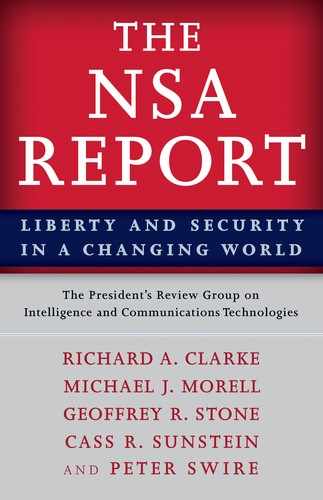ON AUGUST 27, 2013, THE PRESIDENT announced the creation of the Review Group on Intelligence and Communications Technologies. The immediate backdrop for our work was a series of disclosures of classified information involving foreign intelligence collection by the National Security Agency. The disclosures revealed intercepted collections that occurred inside and outside of the United States and that included the communications of United States persons and legal permanent residents, as well as non-United States persons located outside the United States. Although these disclosures and the responses and concerns of many people in the United States and abroad have informed this Report, we have focused more broadly on the creation of sturdy foundations for the future, safeguarding (as our title suggests) liberty and security in a rapidly changing world.
Those rapid changes include unprecedented advances in information and communications technologies; increased globalization of trade, investment, and information flows; and fluid national security threats against which the American public rightly expects its government to provide protection. With this larger context in mind, we have been mindful of significant recent changes in the environment in which intelligence collection takes place.
For example, traditional distinctions between “foreign” and “domestic” are far less clear today than in the past, now that the same communications devices, software, and networks are used globally by friends and foes alike. These changes, as well as changes in the nature of the threats we face, have implications for the right of privacy, our strategic relationships with other nations, and the levels of innovation and information-sharing that underpin key elements of the global economy.
In addressing these issues, the United States must pursue multiple and often competing goals at home and abroad. In facing these challenges, the United States must take into account the full range of interests and values that it is pursuing, and it must communicate these goals to the American public and to key international audiences. These goals include:
PROTECTING THE NATION AGAINST THREATS TO OUR NATIONAL SECURITY. The ability of the United States to combat threats from state rivals, terrorists, and weapons proliferators depends on the acquisition of foreign intelligence information from a broad range of sources and through a variety of methods. In an era increasingly dominated by technological advances in communications technologies, the United States must continue to collect signals intelligence globally in order to assure the safety of our citizens at home and abroad and to help protect the safety of our friends, our allies, and the many nations with whom we have cooperative relationships.
PROMOTING OTHER NATIONAL SECURITY AND FOREIGN POLICY INTERESTS. Intelligence is designed not only to protect against threats but also to safeguard a wide range of national security and foreign policy interests, including counterintelligence, counteracting the international elements of organized crime, and preventing drug trafficking, human trafficking, and mass atrocities.
PROTECTING THE RIGHT TO PRIVACY. The right to privacy is essential to a free and self-governing society. The rise of modern technologies makes it all the more important that democratic nations respect people’s fundamental right to privacy, which is a defining part of individual security and personal liberty.
PROTECTING DEMOCRACY, CIVIL LIBERTIES, AND THE RULE OF LAW. Free debate within the United States is essential to the long-term vitality of American democracy and helps bolster democracy globally. Excessive surveillance and unjustified secrecy can threaten civil liberties, public trust, and the core processes of democratic self-government. All parts of the government, including those that protect our national security, must be subject to the rule of law.
PROMOTING PROSPERITY, SECURITY, AND OPENNESS IN A NETWORKED WORLD. The United States must adopt and sustain policies that support technological innovation and collaboration both at home and abroad. Such policies are central to economic growth, which is promoted in turn by economic freedom and spurring entrepreneurship. For this reason, the United States must continue to establish and strengthen international norms of Internet freedom and security.
PROTECTING STRATEGIC ALLIANCES. The collection of intelligence must be undertaken in a way that preserves and strengthens our strategic relationships. We must be respectful of those relationships and of the leaders and citizens of other nations, especially those with whom we share interests, values, or both. The collection of intelligence should be undertaken in a way that recognizes the importance of cooperative relationships with other nations and that respects the legitimate privacy interests and the dignity of those outside our borders.
The challenge of managing these often competing goals is daunting. But it is a challenge that the nation must meet if it is to live up to its promises to its citizens and to posterity.
